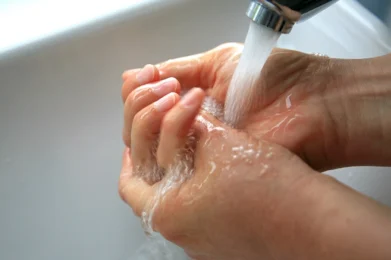In This Article:
- When we experience discomforts, such as heel pain or foot soreness, it can interfere with regular physical activity, like walking or exercise. Whether or not you’re an athlete, taking good care of your feet and engaging in regular rehabilitation is essential. If you’re experiencing pain, but it isn’t severe, try some at-home holistic remedies for your foot soreness.
Our feet serve as the foundation of our bodies. Therefore, when we experience discomforts, such as heel pain or foot soreness, it can interfere with regular physical activity, from exercise to even basic mobility and the ability to walk.
Heel pain comes from a variety of different conditions or ailments, which are outlined below. People who put strain on their feet from overuse or repeated injury are susceptible to heel pain. For example, wearing high-heeled shoes, standing on your feet for long periods and straining your feet muscles and tendons from athletic training or running can all contribute to ailments that cause foot soreness.
Luckily, there are steps you can take to prevent further injury and help alleviate your pain. Read on for tips on how to deal with heel pain, foot soreness and other conditions.
Foot soreness and other common conditions
The origin of your foot soreness or heel pain can come from overusing the muscles or from wearing shoes without arch support or that squeeze your toes together. While your discomfort may be minor at first, over time, the way you use your feet can cause permanent damage or persistent pain.
Athletes and fitness lovers often receive foot issues from injuries, strains or pure exhaustion. Whether or not you’re an athlete, taking good care of your feet and engaging in regular rehabilitation is essential. Always stretch before and after a workout and do warmups to prepare your body for any physical exertion and avoid sports injuries. The better prepared you are, the lower the chance you will hurt yourself.
Below is a list of common foot ailments. Learn more about how they occur and how you can maintain your feet in a healthy, good condition.
- Plantar Fasciitis – This causes pain in the bottom of the heel. When you put too much pressure on your heel, your plantar fascia, the tissue that connects your heel to your toes across the bottom of your foot, can become inflamed. This inflammation leads to pain and discomfort.
- Achilles Tendinitis – Your Achilles is the tendon that connects your calf to your heel. When you overuse your Achilles, you can get tendinitis, in which the tendon becomes inflamed, swollen and irritated. Typically, you’ll feel this pain in the back of your heel.
- Foot soreness – Foot soreness could be related to various conditions. You should visit a doctor if your pain doesn’t disappear after a few weeks of at-home remedies.
- Posterior Tendon Dysfunction – When you injure this tendon, the strength of your foot weakens because your muscles can’t engage properly, and they lose the ability to support your arch adequately. This can cause pain, typically around your ankle.
Holistic remedies for heel pain
If you’re experiencing pain, but it isn’t severe, try some at-home remedies for your foot soreness. The intensity of your heel pain can fade with time or resolve itself altogether with proper care and strengthening. Here are some at-home remedies to address minor ailments and maintain the health of your feet:
- Relax and rest. If you’re experiencing pain, take a break from activities that strain your feet, such as running, standing for extended periods or jumping.
- Ice and heat. Put a heating pad or ice on your heel interchangeably for at least 15 to 20 minutes three times a day.
- Proper shoe wear. Ensure you are wearing shoes that provide adequate support for your feet. If you practice any sport, wear shoes designed for the sport you practice.
- Insoles. Not all shoes have the proper support. Invest in insoles that will protect you from further strain or injury.
- Pain relievers. Many over-the-counter medications can help you reduce inflammation and mild pain.
- Foot strength. Strengthening the muscles in your feet and ankles can improve your mobility and reduce pain. Try “drawing” each letter of the alphabet in the air with your toes. This exercise forces you to use your foot in less common movements, which can simultaneously make you stronger and more flexible. Another good exercise is to practice standing on one leg and to work on increasing the duration.
How to treat chronic heel pain and foot soreness
Severe, chronic pain can make you feel hopeless, but alternatives are available to you. Try some of these practices if you have ongoing discomfort in your heels. They can help you prevent further injury and, hopefully, provide you with relief.
- Wear comfy shoes with good arch support
- Don’t wear high heel shoes
- Maintain a healthy weight for your height and body
- Stretch your feet and toes before exercising
- Protect your feet with good foot hygiene
- Don’t go barefoot outdoors
When lifestyle changes and at-home care doesn’t fix your symptoms, it’s time to see a podiatrist. Podiatrists are doctors specializing in foot care and they can help identify the source of your foot soreness or heel pain, as well as come up with a treatment plan.
To seek podiatry services, visit a Valleywise Health Medical Center. Call 1-833-VLLYWSE to book an in-person or virtual appointment today.








